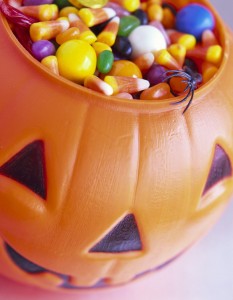 The question of the month is: How do you manage trick-or-treating overload without being coined the Grinch Who Stole Halloween?
The question of the month is: How do you manage trick-or-treating overload without being coined the Grinch Who Stole Halloween?
Here are a few suggestions to keep the kids’ sugar comas and your day-after guilt to a minimum:
First off, limit the frenzy altogether. Don’t allow your kids to trick-or-treat for hours. Discuss, ahead of time, that they are only allowed to trick-or-treat until their bag (or bucket) is full. Make your rules about obtaining and consuming candy very clear. Take the opportunity to explain some healthy-living tips to your young ones.
Shift the focus away from candy. Host a Halloween party that encourages other festive activities.
Host a Halloween Planning Committee for your neighborhood and talk with other adults about the candy problem. Work together to offer healthier trick-or-treating options.
Try separating the trick-or-treat loot into individual bags for each person. Zip-lock bags work great for this! Grab a marker and write down who the bag belongs to, and for what day it’s allocated. Each day, pull out a bag of treats and don’t allow your kids (or yourself) to have more than that day’s share.
If you’re a dessert-eating family, you can capitalize on it by using Halloween candy as an ingredient. By doing this, you’re offering the same sweet stuff you normally do, but you eliminate all day sweets-snacking. For example, you could make milkshakes and parfaits with crushed candy bars instead of Hershey’s syrup.
Create a creepy-cool fairy tale. Charles Shulz’s The Great Pumpkin would make a fabulous Tooth Fairy-like character for Halloween. Have your kids put part of their candy in a special place before bed. When all is quiet and the coast is clear, swap it out for some autumn-inspired gifts, money or other small token. This way, no one feels cheated!
Teach your kids a lesson in economics. Assign a dollar value for each type of candy and allow them to choose which ones they want to sell to you. Take them to the store and let them spend their earnings. They give up most of their candy, but at least they get something in return.
A lot of answers to this problem include you taking possession of the candy. This presents a whole new problem. As much as I hate to say this, you might have to throw it away. Most food banks don’t need (or want) candy, although it’s not a bad idea to look for charities that might. Some candy might be good until the next year, but as a general rule, handing out year-old candy to trick-or-treaters is a bad idea.
What do you do to limit candy-overload at Halloween?

